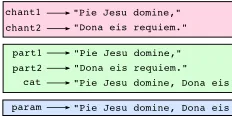Functions

Functions
Functions Functions are reusable pieces of programs. They allow you to give a name to a block of statements, allowing you to run that block using the specified name anywhere in your program and any n...
📚 Read more at A Byte of Python🔎 Find similar documents

Functions
Quite often we need to perform a similar action in many places of the script. For example, we need to show a nice-looking message when a visitor logs in, logs out and maybe somewhere else. Functions a...
📚 Read more at Javascript.info🔎 Find similar documents

Functions
You have seen quite a lot of JavaScript already, and now you are ready for functions. Soon you will see that you have been using functions already, but now it is time to learn how to start writing you...
📚 Read more at JavaScript from Beginner to Professional🔎 Find similar documents

FUNCTIONS
3 FUNCTIONS You’re already familiar with the print() , input() , and len() functions from the previous chapters. Python provides several built-in functions like these, but you can also write your own...
📚 Read more at Automate the Boring Stuff with Python🔎 Find similar documents

Functions
You have seen quite a lot of JavaScript already, and now you are ready for functions. Soon you will see that you have been using functions already, but now it is time to learn how to start writing yo...
📚 Read more at JavaScript from Beginner to Professional🔎 Find similar documents

3. Functions
3. Functions 3.1. Definitions and use In the context of programming, a function is a named sequence of statements that performs a desired operation. This operation is specified in a function definitio...
📚 Read more at How to Think Like a Computer Scientist🔎 Find similar documents

Chapter 3 Functions
In the context of programming, a function is a named sequence of statements that performs a computation. When you define a function, you specify the name and the sequence of statements. Later, you can...
📚 Read more at Think Python🔎 Find similar documents

1.7 Functions
As your programs start to get larger, you’ll want to get organized. This section briefly introduces functions and library modules. Error handling with exceptions is also introduced. Custom Functions U...
📚 Read more at Practical Python Programming🔎 Find similar documents

Basic functions
We have been calling functions for a while already. Remember prompt() , console.log() , push() , and sort() for arrays? These are all functions. Functions are a group of statements, variable declarati...
📚 Read more at JavaScript from Beginner to Professional🔎 Find similar documents

Python Functions
Functions are the re-usable pieces of code which helps us to organize structure of the code. We create functions so that we can run a set of statemen…
📚 Read more at ThePythonGuru🔎 Find similar documents

Python Functions
Functions are the re-usable pieces of code which helps us to organize structure of the code. We create functions so that we can run a set of statemen…
📚 Read more at ThePythonGuru🔎 Find similar documents

Chapter 10 - Functions
A function is a structure that you define. You get to decide if they have arguments or not. You can add keyword arguments and default arguments too. A function is a block of code that starts with the...
📚 Read more at Python 101🔎 Find similar documents


